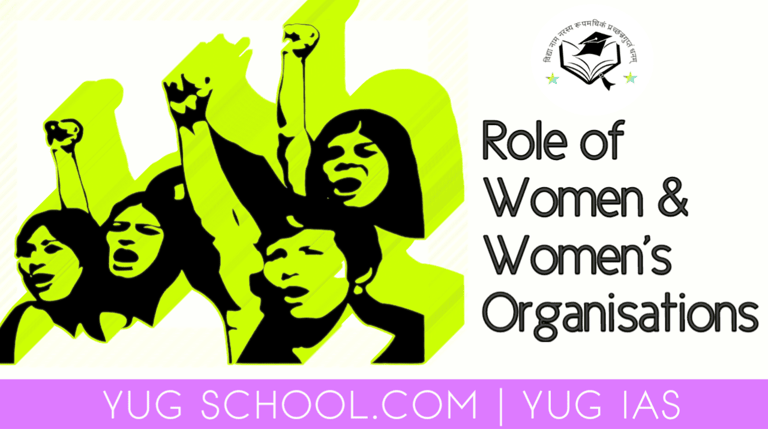Role of Women and Women's Organisation
Throughout history, women have played vital roles in shaping societies and driving progress across various spheres, Women's organizations have further amplified these efforts.
GENERAL STUDIES 1


The narrative of human progress is incomplete, even distorted, without acknowledging the profound and multifaceted role of women. For too long, history has been told through a predominantly male lens, obscuring the contributions, struggles, and triumphs of half the world's population. Today, however, we're witnessing a powerful shift, a reclamation of space, and a recognition of the indispensable role women play in shaping our world.
This isn't just about equality; it's about completeness. It's about understanding that a society that fails to harness the potential of its women is a society operating at a fraction of its capacity. Women bring unique perspectives, skills, and experiences that enrich every aspect of life, from family and community to business and politics.
The Pillars of Strength: Roles Women Play
Caregivers and Nurturers: Traditionally, women have been the primary caregivers, nurturing families and communities. This role, often undervalued, is the bedrock of society. Think of the countless mothers who juggle work and family, the grandmothers who offer wisdom and support, the women who volunteer in community centers, providing essential care. These acts of love and dedication are the threads that hold our social fabric together.
Consider the work of organizations like "Mothers2mothers," which trains and employs women living with HIV as frontline health workers in Africa. These women provide vital support to other mothers, demonstrating the power of lived experience and peer support.
Economic Drivers: Women are increasingly vital to the global economy. They are entrepreneurs, business leaders, and essential workers. When women have access to education, financial resources, and equal opportunities, they contribute significantly to economic growth.
Look at the rise of women entrepreneurs in the tech industry. Women like Whitney Wolfe Herd, the founder of Bumble, are not only creating successful businesses but also challenging traditional power structures.
Agents of Change: Women are at the forefront of social and political movements. They are advocating for human rights, environmental protection, and peace. They are challenging injustice and demanding equality.
The #MeToo movement, sparked by women sharing their experiences of sexual harassment and assault, is a powerful example of women using their voices to drive social change. It shows the strength of collective action and the power of speaking truth to power.
The work of Malala Yousafzai, who has championed girl's education, shows the power of one person to create change.
Innovators and Creators: Women are pushing boundaries in science, technology, arts, and culture. They are bringing fresh perspectives and innovative solutions to the world's challenges.
Dr. Katalin Karikó, whose research was instrumental in the development of mRNA vaccines, is a shining example of a woman's contribution to scientific advancement. Her perseverance shows that dedication can change the world.
Community Builders: In local communities, women frequently take on leadership roles, organizing events, supporting vulnerable individuals, and building stronger social connections.
Many local women's groups around the world focus on providing micro-loans to women. These programs empower women to start their own businesses and improve their families' lives, building stronger communities from the ground up.
The Power of Collective Action: Women's Organizations
Women's organizations play a crucial role in amplifying women's voices, providing support, and driving social change. They serve as platforms for advocacy, education, and empowerment.
Advocacy and Lobbying: These organizations work to influence policy and legislation, ensuring that women's rights are protected and promoted. They advocate for issues such as gender equality, reproductive rights, and economic justice.
Organizations like UN Women work on a global scale to promote gender equality and empower women. They play a vital role in shaping international policies and norms.
Support and Empowerment: Women's organizations provide essential support services, such as counseling, legal aid, and job training. They create safe spaces for women to share their experiences and build community.
Organizations that run women's shelters, provide resources for survivors of domestic violence, and offer mentorship programs are vital in supporting women who face hardship.
Education and Awareness: These organizations raise awareness about gender inequality and promote women's rights through education and outreach programs. They challenge stereotypes and promote positive representations of women.
Organizations that create educational materials and conduct workshops on gender equality play a crucial role in changing attitudes and behaviors.
Building Networks: Women's organizations facilitate networking and collaboration, connecting women with resources and opportunities. They create spaces for women to share their knowledge and expertise.
Professional women's networks offer mentorship, networking events, and leadership development opportunities, helping women advance in their careers.
Humanizing the Response: Beyond Statistics
It's easy to get lost in statistics and abstract concepts. But at the heart of this discussion are real women, with real stories, real struggles, and real triumphs.
Think of the single mother working two jobs to provide for her children, the young girl fighting for the right to an education, the activist risking her life to defend human rights, and the scientist dedicating her career to finding a cure for a disease. These are the stories that remind us of the strength, resilience, and courage of women.
Consider the emotional toll of daily sexism that many women experience. The microaggressions, the dismissive attitudes, the constant feeling of being undervalued. These are all real experiences that affect women's lives.
Also, consider the women who are not highlighted in the media, the rural women who work in the fields, the women who are caring for sick family members, and the women who are simply trying to make a better life for themselves and their children. Their contributions are just as important.
Moving Forward: A Call to Action
The journey towards gender equality is far from over. We must continue to challenge gender stereotypes, dismantle discriminatory systems, and create a world where all women have the opportunity to thrive.
We must invest in women's education and economic empowerment.
We must support women's leadership in all sectors of society.
We must challenge harmful social norms and attitudes.
We must amplify the voices of women from marginalized communities.
We must listen to women, and believe their experiences.
By recognizing and valuing the role of women and supporting women's organizations, we can create a more just, equitable, and prosperous world for all. This isn't just a matter of fairness; it's a matter of unleashing the full potential of humanity. Because when women thrive, we all thrive.
The Essential Role of Women and Women's Organizations
Throughout history, women have played vital roles in shaping societies and driving progress across various spheres. From their contributions to families and communities to their leadership in various fields, their impact is undeniable. Women's organizations have further amplified these efforts, serving as powerful catalysts for change and advocacy.
1. Economic Empowerment:
Women are increasingly participating in the workforce, contributing significantly to economies globally.
Women-led businesses are on the rise, driving innovation and job creation.
Organizations like the National Women's Business Council (NWBC) in the US and the Federation of Indian Women Entrepreneurs (FIWE) in India advocate for women entrepreneurs and provide resources for their success.
Breaking down barriers to economic participation: Women's organizations advocate for policies that address gender-based discrimination in the workplace and promote equal pay for equal work.
Supporting women entrepreneurs: These organizations offer mentorship, networking opportunities, and other resources to help women start and grow their own businesses.
2. Political Participation:
Women are actively engaging in political processes, holding leadership positions and influencing policy decisions.
Movements like the Suffragettes in the early 20th century paved the way for women's suffrage, and organizations like the National Organization for Women (NOW) in the US and the All India Democratic Women's Association (AIDWA) in India continue to fight for women's political rights.
3. Social Activism:
Women are at the forefront of social movements addressing issues like gender equality, poverty, education, and healthcare.
Organizations like the Malala Fund advocate for girls' education, while groups like the Self Employed Women's Association (SEWA) in India empower marginalized women through economic opportunities.
4. Education and Healthcare:
Women play a crucial role in educating future generations, working as teachers and administrators.
They are also actively involved in healthcare, serving as doctors, nurses, and community health workers.
Organizations like the Global Alliance for Vaccines and Immunization (GAVI) and the United Nations Children's Fund (UNICEF) work towards improving access to education and healthcare for women and girls worldwide.
Raising awareness about women's health issues: These organizations work to educate women about their health rights and empower them to make informed decisions about their bodies.
5. Community Development:
Women are often the driving force behind community development initiatives, addressing local needs and challenges.
They contribute significantly to social welfare, environmental protection, and cultural preservation.
Organizations like the National Council of Women's Organizations (NCWO) in the US and the Women's Development Corporation (WDC) in India support women's leadership in community development.
In Conclusion:
The roles of women and women's organizations are multifaceted and far-reaching. Their contributions are essential for building a more equitable, just, and sustainable world. By recognizing and supporting their efforts, we can empower women to reach their full potential and create a better future for all.
Here's a glimpse into the multifaceted roles of women and women's organizations:
